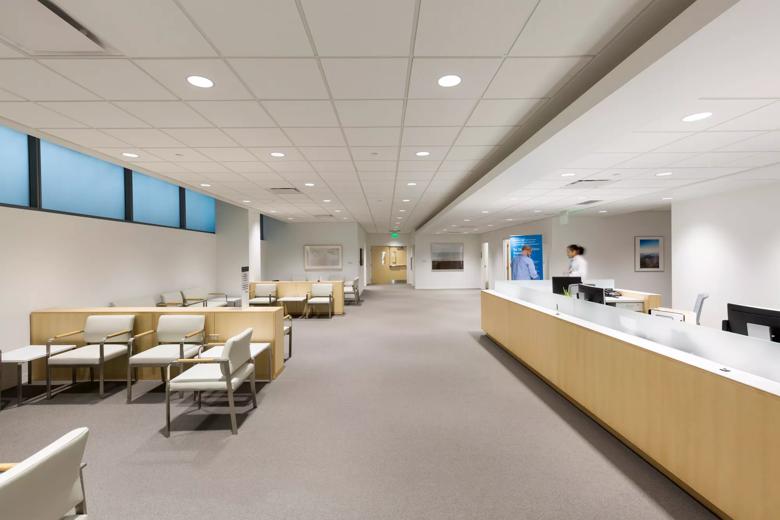Standard is based on monitoring features of buildings that impact human health and wellness; CCCFM is one of the first medical offices to receive certification
Cleveland Clinic News Service | 216.444.0141
We’re available to shoot custom interviews & b-roll for media outlets upon request.
CCNS health and medical content is consumer-friendly, professional broadcast quality (available in HD), and available to media outlets each day.


Image content: This image is available to view online.
View image online (https://assets.clevelandclinic.org/transform/3d51c62f-a23a-4edf-8438-5679698853d9/FunctMed-5-scaled_jpg)
Cleveland Clinic’s Center for Functional Medicine (Photo by: Bostwick Design Partnership)
Cleveland Clinic’s Center for Functional Medicine Suite is one of the first medical offices to be awarded WELL Certification, a new building standard that integrates human health into building design and operation.
The WELL Building Standard evaluates a building’s performance based on seven core concepts: air quality, water quality, healthy foods, light quality, integration of fitness, comfortable and productive workspaces, cognitive and emotional health, and support for innovative features that impact the interaction between buildings and human health.
“Cleveland Clinic is committed to supporting health through our buildings by providing a therapeutic and consistent environment for our patients and caregivers that addresses the link between a person’s wellness and their built environment,” said Christopher Connell, Chief Design Officer at Cleveland Clinic. “We have made healthy environments a priority. Utilizing the WELL building standard is a continuation of that, and we are proud to have our first WELL certified space at Cleveland Clinic.”
Cleveland Clinic played a role in the development of the standard – Chief Wellness Officer, Michael Roizen, M.D., led a comprehensive medical review of the WELL Building Standard. WELL complements LEED certification, but while LEED focuses on green building, the WELL Building Standard concentrates on the health of the occupants inside the space.
Opening in late 2016, the Functional Medicine Suite is located on Cleveland Clinic’s main campus and spans 17,000 square feet. It includes 16 exam rooms, suites for virtual visits, meeting rooms, its own laboratory and spaces for shared medical appointments. The provider suite is open concept to foster collaboration between the multidisciplinary teams of physicians, nurses, medical assistants, health coaches and nutritionists who care for functional medicine patients.
“Functional medicine is a natural fit for this new building standard, as we are constantly assessing how lifestyle and environmental factors affect our well-being.” said Mark Hyman, M.D., Director of Cleveland Clinic’s Center for Functional Medicine. “In functional medicine, we want to help people thrive – and that should start right when a patient or caregiver walks through our door. This space demonstrates our dedication to optimizing health.”
The Center for Functional Medicine Suite – the second WELL-certified project in Ohio – was awarded WELL Certification at the Silver Level. Highlights of the space include:
“From the artwork to the carpet to the shape of the desks, when designing this space, we thought about how each feature affects a patient or caregiver, and worked to incorporate health and wellness into all aspects of the design,” said Tawny Jones, administrator for the Center for Functional Medicine, who was integral in the design of the suite.
The WELL Certification process involves rigorous testing and a final evaluation carried out by the Green Business Certification Inc. (GBCI), which is the third-party certification body for the WELL Building Standard, to ensure the project has met all WELL Certified Silver performance requirements. Every three years, a project must apply for recertification.
“The Cleveland Clinic has a global reputation for its contributions to advancing human health through its strong research platform, medical practice excellence and commitment to education, both academic and community-based,” said Rick Fedrizzi, chairman and CEO of the International WELL Building Institute. “Now, with a WELL Certified space for its employees, the Cleveland Clinic is demonstrating how being intentional about how we design, construct and maintain the places we spend so much of our workdays can have a positive effect on health.”
In 2014, Cleveland Clinic became the first academic medical center to begin a functional medicine program. Functional medicine is a personalized, systems-oriented approach that looks at the underlying causes of disease, while focusing on the whole person rather than an isolated set of symptoms. Physicians look at a patient’s history and interactions among genetic, environmental and lifestyle factors that can influence long-term health and complex, chronic disease. In 2017, there were more than nine-thousand patient visits to the center.
Cleveland Clinic is a nonprofit multispecialty academic medical center that integrates clinical and hospital care with research and education. Located in Cleveland, Ohio, it was founded in 1921 by four renowned physicians with a vision of providing outstanding patient care based upon the principles of cooperation, compassion and innovation. Cleveland Clinic has pioneered many medical breakthroughs, including coronary artery bypass surgery and the first face transplant in the United States. Cleveland Clinic is consistently recognized in the U.S. and throughout the world for its expertise and care. Among Cleveland Clinic’s 82,600 employees worldwide are more than 5,786 salaried physicians and researchers, and 20,700 registered nurses and advanced practice providers, representing 140 medical specialties and subspecialties. Cleveland Clinic is a 6,728-bed health system that includes a 173-acre main campus near downtown Cleveland, 23 hospitals, 280 outpatient facilities, including locations in northeast Ohio; Florida; Las Vegas, Nevada; Toronto, Canada; Abu Dhabi, UAE; and London, England. In 2024, there were 15.7 million outpatient encounters, 333,000 hospital admissions and observations, and 320,000 surgeries and procedures throughout Cleveland Clinic’s health system. Patients came for treatment from every state and 112 countries. Visit us at clevelandclinic.org. Follow us at x.com/CleClinicNews. News and resources are available at newsroom.clevelandclinic.org.
Editor’s Note: Cleveland Clinic News Service is available to provide broadcast-quality interviews and B-roll upon request.